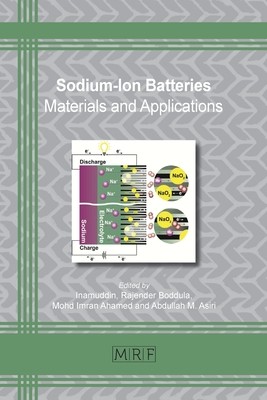
- We will send in 10–14 business days.
- Author: Inamuddin
- Publisher: Materials Research Forum LLC
- ISBN-10: 1644900823
- ISBN-13: 9781644900826
- Format: 15.2 x 22.9 x 1.5 cm, minkšti viršeliai
- Language: English
- SAVE -10% with code: EXTRA
Reviews
Description
Sodium-ion batteries are likely to be the next-generation power sources. They offer higher safety than lithium-ion batteries and, most important, sodium is available in unlimited abundance. The book covers the fundamental principles and applications of sodium-ion batteries and reports experimental work on the use of electrolytes and different electrode materials, such as silicon, carbon, conducting polymers, and Mn- and Sn-based materials. Also discussed are state-of-the-art, future prospects and challenges in sodium-ion battery technology. Keywords: Sodium-Ion Batteries, Lithium-Ion Batteries, Carbon Nanofibers, Conducting Polymers, Electrode Materials, Electrolytes, Graphene, Carbon Anodes, Magnetic Nanomaterials, Mn-based Materials, Sn-based Materials, Na-O2 Batteries, NASICON Electrodes, Organic Electrodes, Polyacetylene, Polyaniline, Polyphenylene, Redox Mediators, Reversible Capacity, Singlet Oxygen, Superoxide Stability.
EXTRA 10 % discount with code: EXTRA
The promotion ends in 22d.17:37:38
The discount code is valid when purchasing from 10 €. Discounts do not stack.
- Author: Inamuddin
- Publisher: Materials Research Forum LLC
- ISBN-10: 1644900823
- ISBN-13: 9781644900826
- Format: 15.2 x 22.9 x 1.5 cm, minkšti viršeliai
- Language: English English
Sodium-ion batteries are likely to be the next-generation power sources. They offer higher safety than lithium-ion batteries and, most important, sodium is available in unlimited abundance. The book covers the fundamental principles and applications of sodium-ion batteries and reports experimental work on the use of electrolytes and different electrode materials, such as silicon, carbon, conducting polymers, and Mn- and Sn-based materials. Also discussed are state-of-the-art, future prospects and challenges in sodium-ion battery technology. Keywords: Sodium-Ion Batteries, Lithium-Ion Batteries, Carbon Nanofibers, Conducting Polymers, Electrode Materials, Electrolytes, Graphene, Carbon Anodes, Magnetic Nanomaterials, Mn-based Materials, Sn-based Materials, Na-O2 Batteries, NASICON Electrodes, Organic Electrodes, Polyacetylene, Polyaniline, Polyphenylene, Redox Mediators, Reversible Capacity, Singlet Oxygen, Superoxide Stability.


Reviews